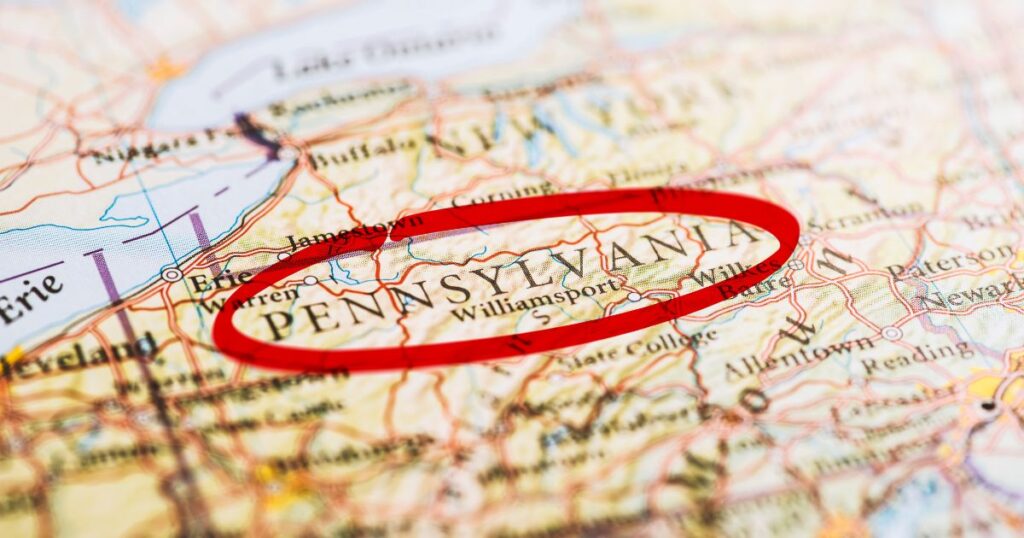Pennsylvania might be a good place to retire. It is located in the Northeastern part of the United States. Pennsylvania has a mix of busy cities and quiet countryside. There are lively cities like Philadelphia. There are also peaceful places like the Pocono Mountains.
- 5 Pros of Retiring in Pennsylvania
- Affordable Cost of Living
- Tax Advantages for Retirees
- Access to Quality Healthcare
- Diverse Landscape and Recreational Activities
- Strong Sense of Community
- 5 Cons of Retiring in Pennsylvania
- Conclusion
- FAQs About Retiring in Pennsylvania
- What is the Average Property Tax Rate in Pennsylvania?
- How Severe are the Winters in Pennsylvania, and How do Residents Cope?
- Are there Reliable Public Transportation Options for Retirees in Pennsylvania?
- What are the Inheritance Tax Rates for Non-Direct Heirs in Pennsylvania?
- Is Part-Time Employment Common for Retirees in Pennsylvania?
So, Pennsylvania gives lots of lifestyle options for retirement. This article explores the pros and cons of retiring in Pennsylvania. It looks at what makes it attractive for retirement. Read on to see if Pennsylvania fits what you want for your retirement years.
5 Pros of Retiring in Pennsylvania
Affordable Cost of Living
Pennsylvania’s charm extends beyond its scenic landscapes; it’s also a haven for retirees seeking affordable living. Compared to other East Coast states, the expenses here—housing, groceries, and transportation—are notably budget-friendly.
Whether you envision your retirement in a serene rural town or amidst the vibrant energy of an urban Centre, Pennsylvania provides diverse and economical living options. With a lower financial burden, you can make the most of your retirement funds, ensuring a comfortable and fulfilling lifestyle.

Tax Advantages for Retirees
Pennsylvania is a tax-friendly haven for retirees, offering significant advantages that can enhance your financial well-being. Social Security benefits and other retirement income enjoy exemption from state taxes, substantially boosting your income.
The state further sweetens the deal with a low sales tax rate and exemptions for essentials like food and clothing. Notably, there’s no inheritance tax for direct heirs, allowing you to pass on your legacy without worrying about additional financial encumbrances. Pennsylvania’s tax advantages create a conducive environment for a secure and thriving retirement.
Access to Quality Healthcare
When it comes to healthcare, Pennsylvania stands out as a state that prioritizes quality. Regularly ranked among the top states for healthcare, Pennsylvania is home to numerous highly rated hospitals and medical facilities.
Retirees can take comfort in knowing they can access top-notch healthcare services. Additionally, the state offers affordable health insurance options, ensuring that your retirement years are spent with peace of mind about your health and well-being.
Diverse Landscape and Recreational Activities
Pennsylvania’s appeal lies in its diverse landscape, allowing retirees to tailor their retirement to their unique tastes. From the idyllic Pocono Mountains to the bustling urban centres like Philadelphia, Pennsylvania offers a range of backdrops to suit various lifestyles.
Outdoor enthusiasts can indulge in many activities, including hiking trails, fishing spots, ski resorts, and golf courses. Meanwhile, culture and history enthusiasts can explore many attractions, from museums to historical sites. Pennsylvania ensures that your retirement is filled with diverse and fulfilling recreational pursuits.

Strong Sense of Community
Retirement in Pennsylvania is not just about a location; it’s about building meaningful connections within a strong community. Known for their warmth and camaraderie, Pennsylvania residents create an inviting atmosphere for retirees.
Active senior communities and organizations flourish, providing ample opportunities for social engagement and a sense of belonging. Whether attending local events or participating in community activities, Pennsylvania fosters a strong sense of community that enriches the retirement experience.
5 Cons of Retiring in Pennsylvania
Climate
Regarding weather, Pennsylvania doesn’t always play nice, especially in the winter. The state is no stranger to cold temperatures, and some regions experience harsh weather conditions that might not be everyone’s cup of tea.
Snowstorms can be a regular occurrence, turning picturesque landscapes into logistical challenges. With winter’s icy grip, power outages become more than an inconvenience, potentially impacting daily life and comfort during the colder months.

Property Taxes
Pennsylvania’s picturesque scenery comes at a cost, often due to relatively high property taxes in certain counties and municipalities. As you consider your retirement budget, factoring in these property taxes is crucial.
The potential impact on overall retirement expenses could be significant, influencing decisions about where to settle down in the Keystone State.
Limited Public Transportation
While Pennsylvania boasts diverse landscapes and communities, it also leans heavily on personal vehicles for transportation. Public transportation options can be limited in some regions, requiring residents and retirees to rely on their cars.
This shift may pose a challenge for those used to the convenience of comprehensive public transit systems, particularly in areas where public transportation options are scarce.
Job Market for Retirees
Retirement only sometimes means complete detachment from the workforce, but in Pennsylvania, the job market for retirees can be somewhat restrictive. Full-time employment opportunities may be limited, with a greater emphasis on part-time and seasonal jobs in certain areas.
Understanding the local job market dynamics becomes crucial for making informed decisions if you’re considering supplementing your retirement income through work.

Inheritance Tax
Pennsylvania is known for its unique approach to inheritance taxes, particularly for non-direct heirs. As you plan your estate, you must know the inheritance tax implications. The state levies taxes on assets inherited by non-direct heirs, potentially impacting the legacy you leave behind.
Navigating this aspect of Pennsylvania’s tax system requires careful consideration in your estate planning to ensure that your loved ones receive the intended benefits without undue financial burdens.
Conclusion
In conclusion, retiring in Pennsylvania is a nuanced decision shaped by enticing attractions and notable challenges. The state’s diverse landscapes, cultural offerings, and relatively lower cost of living in many areas provide a compelling draw for retirees.
However, the prospect of harsh winters, higher property taxes, limited public transportation, and a somewhat restricted job market for retirees require careful consideration. The suitability of Pennsylvania as a retirement destination ultimately hinges on individual preferences and priorities. As you contemplate this significant life choice, weigh the pros and cons against your values and aspirations to make an informed decision tailored to your unique retirement vision.

